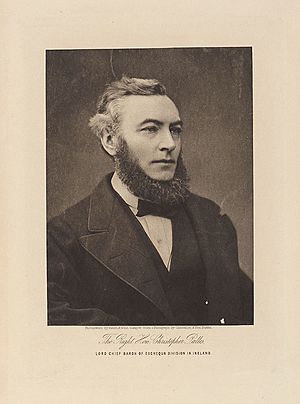Christopher Palles facts for kids
Christopher Palles (born December 25, 1831 – died February 14, 1920) was a very important Irish barrister and judge. A barrister is a lawyer who argues cases in court. He was also a Solicitor-General and Attorney-General.
He worked as a judge for over 40 years. Many people called him "the greatest of the Irish judges". He was the last Lord Chief Baron of the Exchequer from 1874 until he retired in 1916.
Contents
Early Life and Education
Christopher Palles was born on Christmas Day in 1831. His family lived on Lower Gardiner Street in Dublin City, Ireland. He was the third son of Andrew Christopher Palles, who was also a solicitor (another type of lawyer). His mother was Eleanor Mary Palles.
His family came from Italy a long time ago, in the late 1400s. They came with a relative who became an Archbishop of Armagh.
Christopher went to school at Clongowes Wood College. Then he studied at Trinity College Dublin. He finished college in 1852. He was very good at Math and Physics. After that, he studied law at King's Inns in Ireland and Gray's Inn in London.
Becoming a Lawyer and Government Official
Palles became a barrister in Ireland in 1853. This meant he could argue cases in court. In 1865, he earned a special title called Queen's Counsel (Q.C.). This showed he was a very skilled lawyer.
He worked for the government too. From February to November 1872, he was the Solicitor-General. This is a senior legal advisor to the government. Later that year, he became the Attorney-General. This is the chief legal advisor to the government. He also joined the Privy Council, a group of important advisors to the monarch.
Palles tried to become a member of Parliament for Londonderry City in 1872, but he didn't win. He believed that university education should be open to everyone, no matter their religion.
Chief Baron: A Famous Judge
In 1874, Christopher Palles became a judge. He was given the important role of Lord Chief Baron of the Exchequer. This court handled financial cases.
In 1898, his court joined with another court called the Queen's Bench. After this, he was known as "the last of the Chief Barons." He served as a judge for 40 years. During this time, he became known as one of the most important Irish judges ever.
Many people thought he was the greatest Irish judge of his time. Even today, he is highly respected. Some people said he focused too much on small legal details. But a lawyer named Alexander Sullivan, who knew many judges, said Palles was one of the four best judges he had ever seen.
Maurice Healy, another lawyer, wrote about Chief Baron Palles. He said Palles seemed very strict and scary to young lawyers. But Healy also said that everyone "was devoted to him." Palles had a good sense of humor too. One time, a nervous lawyer said his junior didn't want the judge to see a document. Palles joked, "Mr O'Brien, you must never do anything of which your junior would not approve."
A famous painting of Chief Baron Palles from 1903 hangs in Trinity College Dublin.
The West Clare Railway Case
In 1897, Palles heard a funny case called French v. West Clare Railway Co. The famous songwriter Percy French sued the West Clare Railway Company. His train was over four hours late, and he missed a show. He won money for his lost earnings. This case led Percy French to write a very popular song called Are Ye Right There Michael. The song made fun of the railway company for being so slow and disorganized.
Palles also helped create the National University of Ireland in 1908. He was the chairperson for the Dublin part of this new university. He helped choose the first professors and teachers. He also became a founding member of the Governing Body of University College Dublin (UCD) in 1909.
Retirement and Passing
Chief Baron Palles retired in 1916 because he was getting old and sick. He wrote a letter to the Prime Minister, H. H. Asquith. The Prime Minister wrote back, saying that Palles's legal decisions would be remembered and used for many years. This turned out to be true.
Palles passed away in Dublin in 1920. He is buried in Glasnevin Cemetery in Dublin.
Family Life
Christopher Palles married Ellen Doyle in 1862. They had one son, also named Christopher. The family lived in Mountjoy Square in Dublin. Later, they moved to a place called Mountanville in Clonskeagh. They even had a peach orchard there! They also had a home on Fitzwilliam Place, where they added a small chapel.
Palles's wife, Ellen, was often unwell and passed away in 1885. Their son needed special care throughout his life. After Ellen died, Palles's niece, Elizabeth, moved in to help manage his home.
Lasting Impact
Christopher Palles left a huge mark on the law. Even today, his legal decisions are still studied and used by judges and lawyers. Over 1,000 judgments from the past 143 years either include or refer to his decisions.
Lawyers and judges still often ask, "What did Palles have to say on this point?" This shows how important his work was. For example, his definition of "public bar" is still cited today.
Palles is even mentioned in the famous novel Ulysses by James Joyce.
His personal papers are kept at University College Dublin (UCD). This collection helped start UCD's Law Library. In 2018, a group called the Palles Society for Private Law was created to honor him.
 | DeHart Hubbard |
 | Wilma Rudolph |
 | Jesse Owens |
 | Jackie Joyner-Kersee |
 | Major Taylor |


